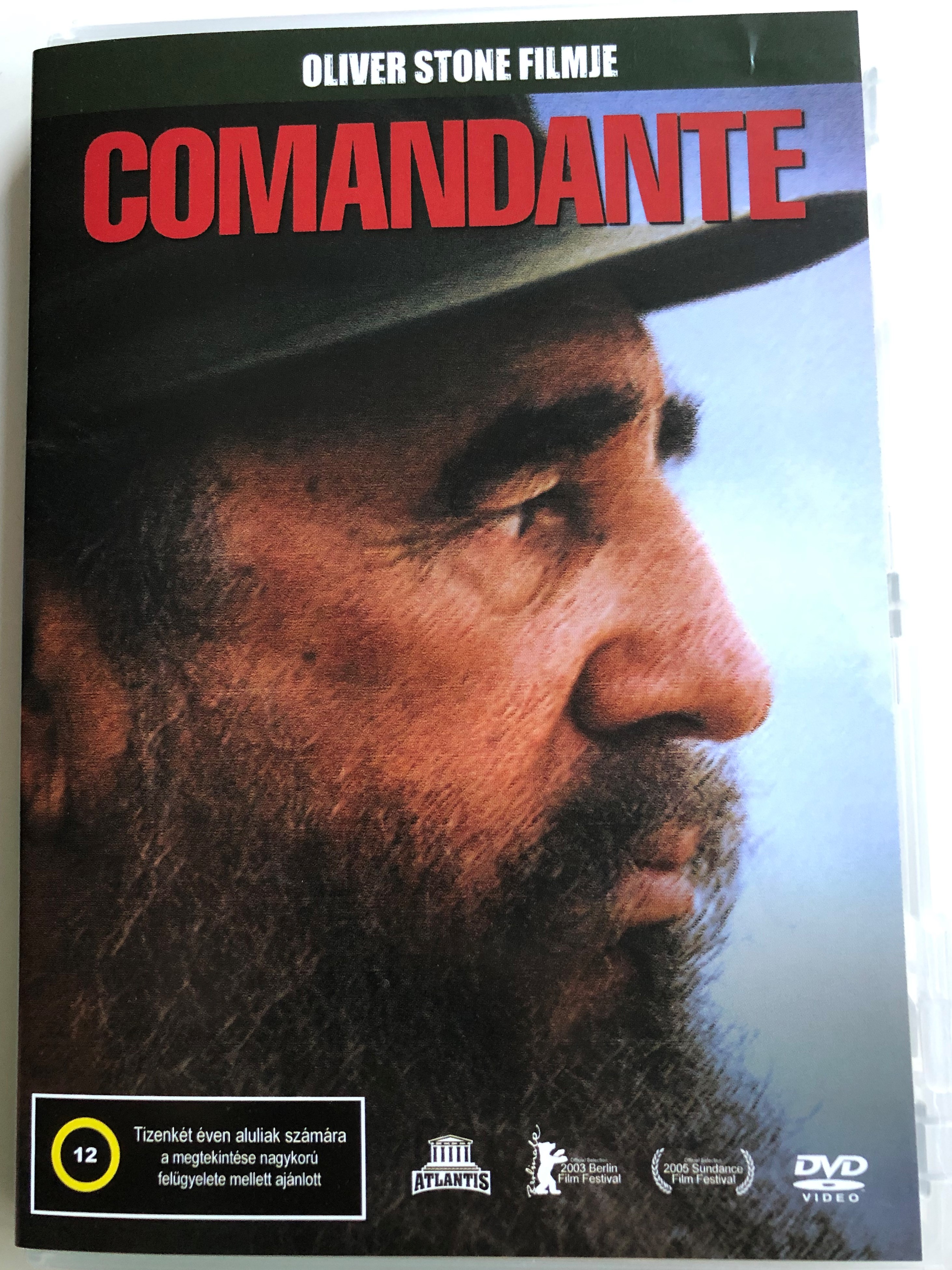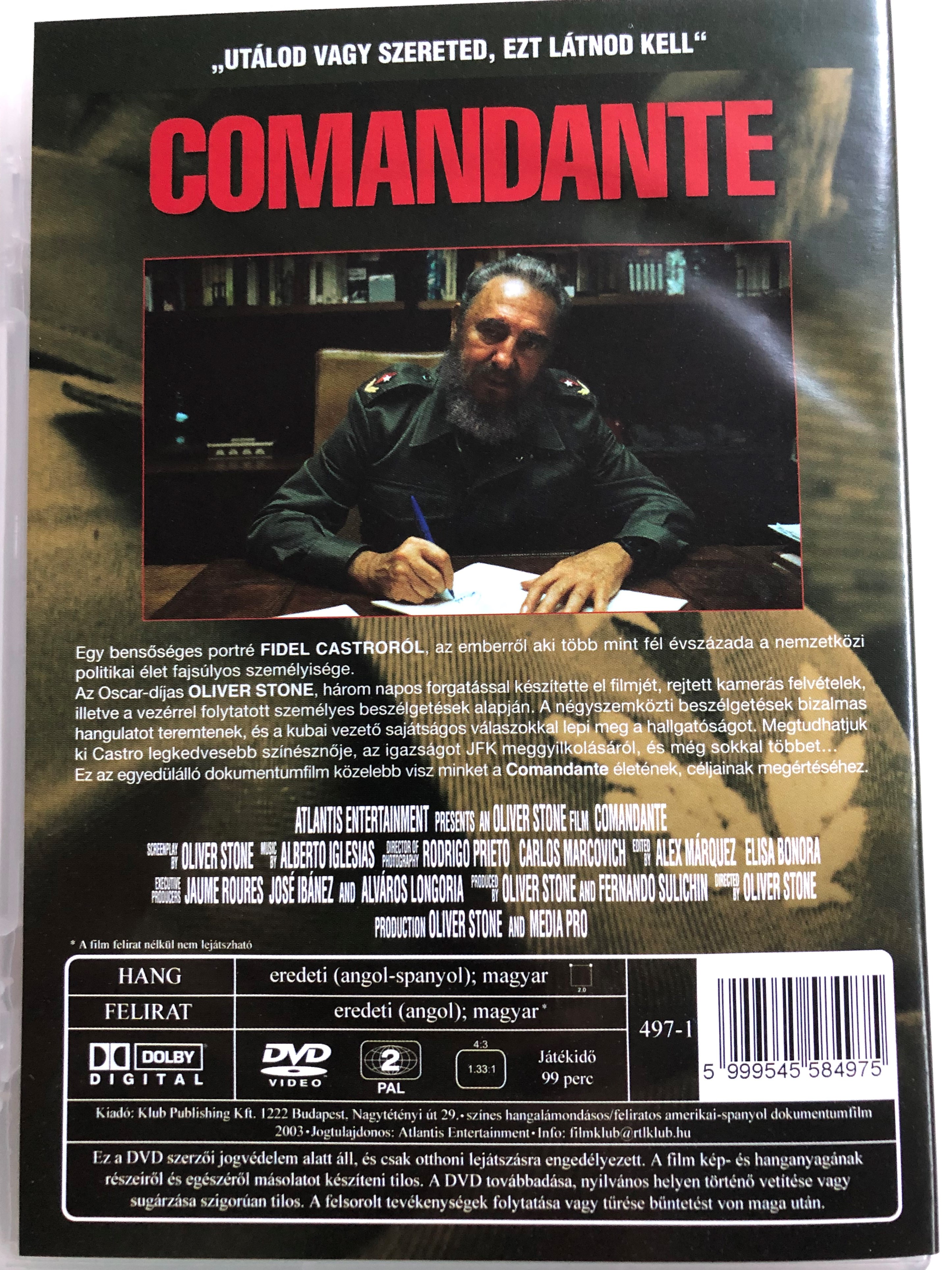Product Overview
Comandante DVD 2003 / Directed by Oliver Stone / Political documentary film with Fidel Castro
UPC 5999545584975
REGION 0 PAL DVD (ALL REGIONS)
MADE IN HUNGARY
AUDIO: English-Spanish, Hungarian 2.0
SUBTITLES: English, Hungarian
Runtime: 99 minutes
English Summary:
Comandante is a political documentary film by American director Oliver Stone. In the film, Stone interviews Cuban leader Fidel Castro on a diverse range of topics. Stone and his film crew visited Castro in Cuba for three days in 2002, and the film was released in 2003, having its premiere at the Sundance Film Festival early that year. The film was partly produced by HBO and was planned for broadcast. Shortly before airtime, after Cuba executed three hijackers of a ferry to the United States and imprisoned more than 70 political dissidents, HBO pulled the program. To this day, it still has not been given a video release in the USA.
Fidel Alejandro Castro Ruz (13 August 1926 – 25 November 2016) was a Cuban revolutionary and politician who served as Prime Minister of Cuba from 1959 to 1976 and President from 1976 to 2008. Ideologically a Marxist–Leninist and Cuban nationalist, he also served as the First Secretary of the Communist Party of Cuba from 1961 until 2011. Under his administration the Republic of Cuba became a one-party communist state; industry and business were nationalized, and state socialist reforms were implemented throughout society.
Born in Birán, Oriente as the son of a wealthy Spanish farmer, Castro adopted leftist anti-imperialist ideas while studying law at the University of Havana. After participating in rebellions against right-wing governments in the Dominican Republic and Colombia, he planned the overthrow of Cuban President Fulgencio Batista, launching a failed attack on the Moncada Barracks in 1953. After a year's imprisonment, Castro traveled to Mexico where he formed a revolutionary group, the 26th of July Movement, with his brother Raúl Castro and Ernesto "Che" Guevara. Returning to Cuba, Castro took a key role in the Cuban Revolution by leading the Movement in a guerrilla war against Batista's forces from the Sierra Maestra. After Batista's overthrow in 1959, Castro assumed military and political power as Cuba's Prime Minister. The United States came to oppose Castro's government and unsuccessfully attempted to remove him by assassination, economic blockade, and counter-revolution, including the Bay of Pigs Invasion of 1961. Countering these threats, Castro aligned with the Soviet Union and allowed the Soviets to place nuclear weapons in Cuba, resulting in the Cuban Missile Crisis – a defining incident of the Cold War – in 1962.
Adopting a Marxist–Leninist model of development, Castro converted Cuba into a one-party, socialist state under Communist Party rule, the first in the Western Hemisphere. Policies introducing central economic planning and expanding healthcare and education were accompanied by state control of the press and the suppression of internal dissent. Abroad, Castro supported anti-imperialist revolutionary groups, backing the establishment of Marxist governments in Chile, Nicaragua, and Grenada, as well as sending troops to aid allies in the Yom Kippur, Ogaden, and Angolan Civil War. These actions, coupled with Castro's leadership of the Non-Aligned Movement from 1979 to 1983 and Cuba's medical internationalism, increased Cuba's profile on the world stage. Following the Soviet Union's dissolution in 1991, Castro led Cuba through the economic downturn of the "Special Period", embracing environmentalist and anti-globalization ideas. In the 2000s, Castro forged alliances in the Latin American "pink tide" – namely with Hugo Chávez's Venezuela – and signed Cuba up to the Bolivarian Alliance for the Americas. In 2006, Castro transferred his responsibilities to Vice President Raúl Castro, who was elected to the presidency by the National Assembly in 2008.
Hungarian Summary:
Egy bensőséges portré Fidel Castroról, az emberről, aki több mint fél évszázada a nemzetközi politikai élet fajsúlyos személyisége. Oliver Stone három napos forgatással készítette el filmjét, rejtett kamerás felvételek, illetve a vezérrel folytatott személyes beszélgetések alapján. A dokumentumfilm közelebb visz minket a Comandante életének, céljainak megértéséhez.
Fidel Alejandro Castro Ruz (Birán, 1926. augusztus 13. – Havanna, 2016. november 25.) kommunista politikus, 1965–2008 között Kuba első számú vezetője: az ország és a minisztertanács elnöke, pártvezér.
Fulgencio Batista rezsimjének megdöntése után 1959-től 1976-ig az ország miniszterelnöke volt, amikor az Államtanács és a Minisztertanács elnöke lett.
1965-ben ő lett a Kubai Kommunista Párt első főtitkára, és az ő vezetésével vált az ország egypárti szocialista köztársasággá.
2008-ban lemondott elnöki és hadvezéri posztjáról és elismerte, hogy fizikai állapota miatt nem tud eleget tenni olyan feladatnak, amely teljes elhivatottságot és mozgékonyságot kíván.
2011-ben megvált első titkári posztjától és távozott a párt központi bizottságából is.
Hamvait Santiago de Cubában helyezték örök nyugalomra.
| Directed by | Oliver Stone |
|---|---|
| Starring | Fidel Castro |
|
Release date
|
|
| Country | United States |










